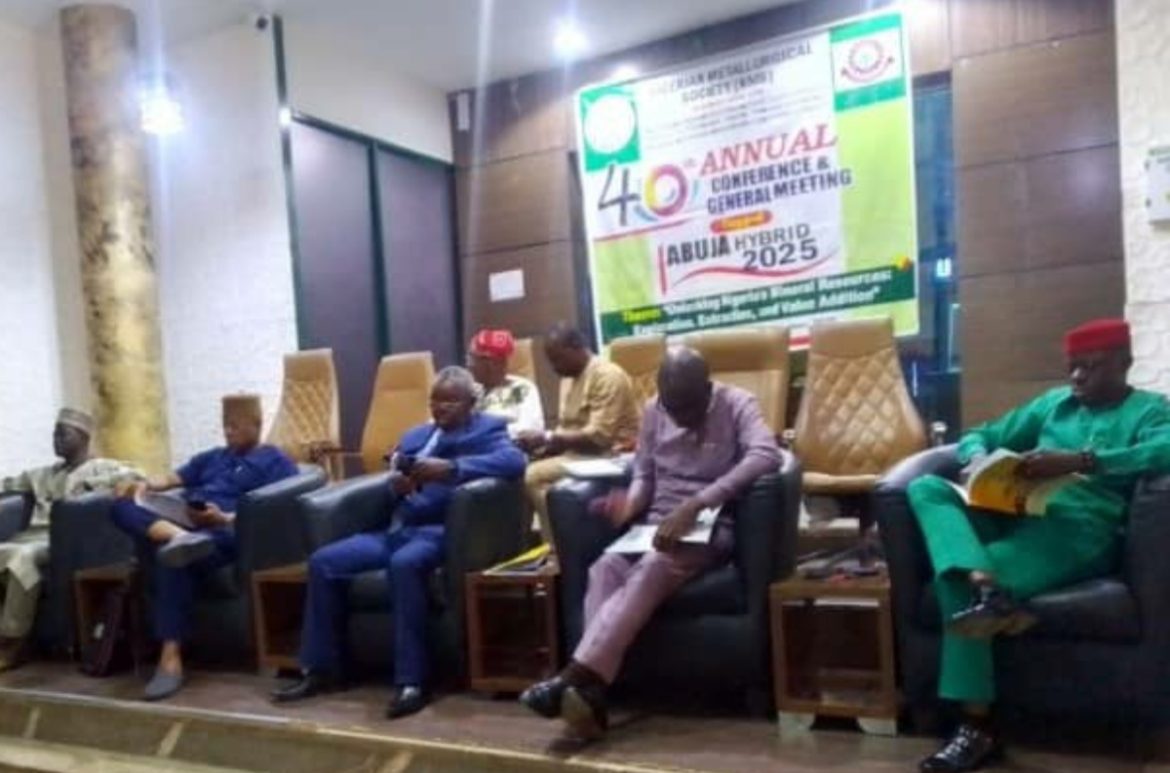By Lucy Ogalue
The Minister of Steel Development, Prince Shuaibu Audu, says Nigeria’s metallurgical sector is key to achieving industrial self-reliance, economic diversification and sustainable growth.
Audu said this while delivering keynote address at the 40th Annual Conference and Annual General Meeting of the Nigerian Metallurgical Society (NMS) on Thursday in Abuja.
The theme of the event is, “Unlocking Nigeria’s Mineral Resources: Exploration, Extraction and Value Addition.”
The minister, represented by his Director, Metallurgical Inspectorate Department, Christopher Wamje, said Nigeria is blessed with more than 44 distinct mineral resources spread across the country.
He, however, lamented that the nation’s over dependence on oil had hindered the full development of its vast mineral and industrial potential.
According to him, the metallurgical sector forms the bridge between mineral extraction and industrial production, providing the foundation for manufacturing, infrastructure, transportation, energy and national defence.
“Metallurgy is not just a technical discipline; it is the foundation upon which industrial capacity, technological advancement and national competitiveness are built.
“The expertise and commitment of metallurgists will determine how efficiently and sustainable we convert our natural endowments into economic prosperity,” he said.
The Minister listed some key achievements of the ministry to include the ongoing revitalisation of the Ajaokuta Steel Company and the National Iron Ore Mining Company (NIOMCO) in Itakpe.
He recalled that the Federal Government signed a Memorandum of Understanding with the original builders of Ajaokuta in 2024 as part of renewed efforts of the President Bola Tinubu’s Renewed Hope Agenda to operationalise the complex.
Audu said that the Ministry was engaging new partners, including Chinese firms, to accelerate the progress.
The Minister also announced the development of a 10-year Steel Industry Roadmap, designed in collaboration with the World Bank and international experts to guide the revival and modernisation of the sector.
Audu further said that the Ministry had established scrap metal collation and recycling centres, beginning in Ogun to promote a circular economy and ensure cleaner raw materials for steel plants.
He said that the Ministry was facilitating a localised iron ore supply chain to reduce import dependence.
He saud this would help save more than 1 billion dollars annually, while pursuing an ambitious production target of 10 million tonnes of liquid steel by 2030.
“We are determined to build a self-sufficient industrial base that will create more than 500,000 direct and indirect jobs and significantly reduce foreign dependence,” he stated.
Audu said that government was strengthening collaboration with the private sector, citing major investments by Inner Galaxy Group, African Industries Group, and KAM Industries as examples of growing confidence in Nigeria’s steel industry.
He said that the Ministry had signed an MoU with the Defence Industries Corporation of Nigeria (DICON) for the local production of military hardware using facilities at Ajaokuta.
The Minister described this as a strategic step towards national security and industrial independence.
Audu said efforts were ongoing to promote green steel production, establish a National Metallurgical Testing Laboratory and enhance human capital development through training and retraining of metallurgical engineers and technicians across the country.
He urged members of the Nigerian Metallurgical Society to continue serving as a bridge between research and industrial application while upholding professional ethics and mentoring young metallurgists.
“Unlocking Nigeria’s mineral wealth requires coordinated efforts from regulators, researchers and investors.
“The time for rhetoric is past; the time for action, innovation and synergy is now,” Audu said.
The Minister congratulated the leadership and members of the Nigerian Metallurgical Society on the successful hosting of their 40th Annual Conference.
He then reaffirmed the government’s commitment to transforming Nigeria’s mineral endowment into sustainable industrial wealth.
Mr Bege Gaiya, Executive Chairman of Zangon Kataf Local Government Area, Kaduna State, stressed the need for government to take full control of mining activities across the country.
According to Gaiya, this will help to curb environmental degradation, community conflicts and illegal operations by artisanal miners.
He said that unregulated mining had led to pollution and clashes in communities, adding that local authorities must prioritise environmental protection and community welfare over monetary gains.
Gaiya urged the Federal Government to adopt the same level of oversight in the solid minerals sector as seen in the oil industry.
According to him, effective regulation will among other things, significantly boost Nigeria’s Gross Domestic Product (GDP) and enhance national security.
Earlier, the National President of NMS, Dr Fidelis Achiv, said that the society’s annual conference was aimed at fostering collaboration among the industry stakeholders and promoting value addition in mineral exploration.
He lamented that Nigeria had continued to lose huge revenue due to the export of raw minerals without processing.
Achiv said that the society was advocating for stronger government involvement, education of miners and partnerships with the private sector to ensure minerals were processed locally before export.
He also emphasised the need to revive and modernise the Ajaokuta Steel Company, which he described as a vital asset capable of transforming Nigeria’s industrial base if concessioned to credible investors. (NAN)

